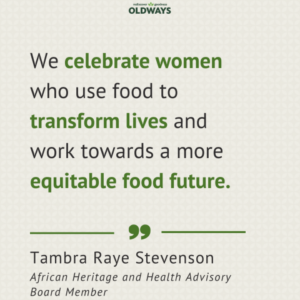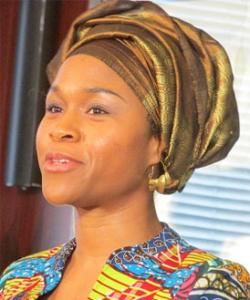Tambra Raye Stevenson, MPH, MA, is an esteemed Oldways African Heritage and Health Advisory Board Member based in Washington, D.C., whose multifaceted expertise spans over nutrition advocacy, food policymaking, and health equity. As the founder and CEO of WANDA (Women Advancing Nutrition, Dietetics, and Agriculture), Tambra has dedicated herself to empowering female food leaders across Africa and the Diaspora. Her extensive background in Nutritional Sciences, Health Communication, Media, Technology, and Democracy underscores her commitment to promoting African diaspora cuisine, nutrition security, and food equity.
Tambra’s influence extends beyond organizational leadership; she holds significant roles in various advisory boards and committees, including the National Agricultural Research, Extension, Education, and Economics Advisory Board and the DC Mayor’s Office on African Affairs’ Health Education Planning Committee. Additionally, her contributions to the Mission Committee for the American Heart Association and the community leadership board for the American Diabetes Association highlight her dedication to addressing non-communicable diseases prevalent in communities of color.
Tambra’s advocacy efforts have garnered recognition, earning her the honor of being named a Union of Concerned Scientist Science Defender in 2021. Her work, featured in reputable publications like The Washington Post, exemplifies her global commitment to health equity and inclusive food systems. As the first regional representative to North America for the African Nutrition Society, Tambra continues to champion reconnecting with African food roots and advocating for inclusive food systems that prioritize health and well-being for all. We had a conversation with Tambra. Read more below!
Can you discuss the key elements emphasized for a fair and sustainable food system from the recent panel discussion at the 2023 SNEB conference? How do topics like the United Nations-endorsed right to food and empowering the next generation shape food citizens’ transformation?
At the 2023 SNEB conference panel, we explored key elements for a fair and sustainable food system, emphasizing unity across disciplines. Empowering the next generation and honoring indigenous foodways emerged as vital themes. We discussed how Western dietary norms marginalize local foods globally, highlighting the need to recognize and support diverse culinary traditions. Access to culturally relevant foods is essential for the right to food, fostering diversity and resilience in our food system.
As the founder of WANDA, can you elaborate on the mission of Women Advancing Nutrition, Dietetics, and Agriculture and how it aims to revitalize food systems through education, advocacy, and innovation?
 As the founder of WANDA, our mission is to empower women in the food system through education, advocacy, and innovation. We reshape narratives through initiatives like our book series, advocate for policy change such as the Food Bill of Rights, and support women entrepreneurs driving innovation in the food industry. Ultimately, we celebrate women who use food to transform lives and work towards a more equitable food future.
As the founder of WANDA, our mission is to empower women in the food system through education, advocacy, and innovation. We reshape narratives through initiatives like our book series, advocate for policy change such as the Food Bill of Rights, and support women entrepreneurs driving innovation in the food industry. Ultimately, we celebrate women who use food to transform lives and work towards a more equitable food future.
WANDA has identified several asks for the White House Conference on Hunger, Nutrition, and Health. Can you discuss the significance of adopting a Food Bill of Rights among these requests and its potential impact on addressing the food and nutrition crisis in the United States?
The Food Bill of Rights is crucial because it addresses the lack of a formal legal framework for food rights, unlike health rights under the UN Declaration. It educates people about their food rights, enhances literacy, and acknowledges food’s importance in the economy and democracy. By integrating diverse voices, it fosters inclusivity and equity.
This intersects with various disciplines and has the potential to uplift society by addressing hunger and improving health. Incorporating food rights into policy would transform our food system, reducing food insecurity. It’s vital for tackling diet-related diseases, fostering healthier habits, and bolstering national security. Without it, our nation’s health and readiness could be compromised.”
As a representative of WANDA and a member of the Food as Medicine Advisory Board, your participation in the Future of Health Summit is fantastic. Can you elaborate on the key lessons, research insights, or innovations discussed during this prestigious event and how they align with WANDA’s mission of transforming healthcare through the power of food? Additionally, how do you envision leveraging the collaborations and partnerships formed at the summit to contribute to the broader goal of revolutionizing the approach to health and well-being in the coming months?
Participating in the Future of Health Summit was enlightening, discussing themes like financing health initiatives and leveraging technology for healthier living. Insights ranged from innovative meal delivery to government policies. WANDA aims to leverage these learnings and partnerships to advance our mission of transforming healthcare through food. In 2024, we focus on driving economic and entrepreneurial development through collaboration across sectors, aiming for tangible change at the intersection of health and wealth.
Your collaboration with the American Diabetes Association’s Project Power is insightful in empowering the community to take control of Type 2 diabetes. Can you share more about the key components and highlights covered in the 2023 series regarding managing Type 2 diabetes, especially the role of food, fitness, stress management, medication, and community support?
Collaborating with the American Diabetes Association’s Project Power has empowered communities to manage Type 2 diabetes. The 2023 series highlighted key components like food, fitness, stress management, medication, and community support.
Project Power offers virtual coaching and innovative technology for tracking food intake and activity levels. Our focus was on community engagement and breaking the stigma surrounding diabetes. Despite challenges, WANDA’s commitment to empowering communities remains strong.
 As the CEO of WANDA, your involvement in the Black Women in Food Summit is noteworthy. Could you share some highlights or key takeaways from the event? How does WANDA’s participation in such gatherings contribute to the broader goals of fostering learning, networking, and support within the Black women community in the food and beverage industry?
As the CEO of WANDA, your involvement in the Black Women in Food Summit is noteworthy. Could you share some highlights or key takeaways from the event? How does WANDA’s participation in such gatherings contribute to the broader goals of fostering learning, networking, and support within the Black women community in the food and beverage industry?
Our involvement in the Black Women in Food Summit was significant. Our session highlighted the pivotal role of black women in advocating for food justice and social impact, emphasizing critical topics like the Food Bill of Rights. The summit provided a vibrant space for community-building and networking, aligning with WANDA’s mission to foster learning and support within the Black women community in the food and beverage industry.
Congratulations on your TEDx talk in 2022! Reflecting on that event, could you share some key highlights or takeaways from your talk regarding celebrating women as food sheroes on World Food Day? Additionally, how has WANDA continued to integrate these messages into it mission and activities since then?
Thank you! The TEDx talk in 2022 was a fantastic opportunity to spotlight the crucial role of food as medicine, particularly in celebrating women as food sheroes on World Food Day. I shared my personal journey, highlighting the importance of reclaiming lost time and culinary heritage, inspired by influential women like Chef Edna Lewis and activist Georgia Gilmore.
Since then, WANDA has integrated these messages into its mission by fostering intergenerational dialogue and solidarity among women globally. Our inaugural Sister Summit in Kenya showcased the power of amplifying marginalized voices in food and health conversations, paving the way for a more equitable future.
What’s next for WANDA in 2024?
In 2024, WANDA remains dedicated to advancing ‘food as medicine’ and community engagement. We’ll empower individuals as healers through initiatives like access to capital and capacity building. Our focus includes advocating for the Food Bill of Rights locally and federally, despite political challenges.
Storytelling will be key, celebrating women as food sheroes and reclaiming culinary heritage. We’ll also extend our impact to Africa, supporting women in the food sector through programs like the WANDA Scholars Program.
Collaborations and partnerships, like the Juneteenth Celebration, will amplify local voices. We plan to host a summit to raise awareness about food as medicine.
Despite challenges and uncertainties, WANDA remains committed to transforming healthcare through food, ensuring access to nutritious food for all.
Learn more about Tambra and WANDA on Instagram (@tambraraye and @_iamwandaorg), Facebook (Women Advancing Nutrition, Dietetics and Agriculture: WANDA and Tambra Raye), or her website.






Leave a comment